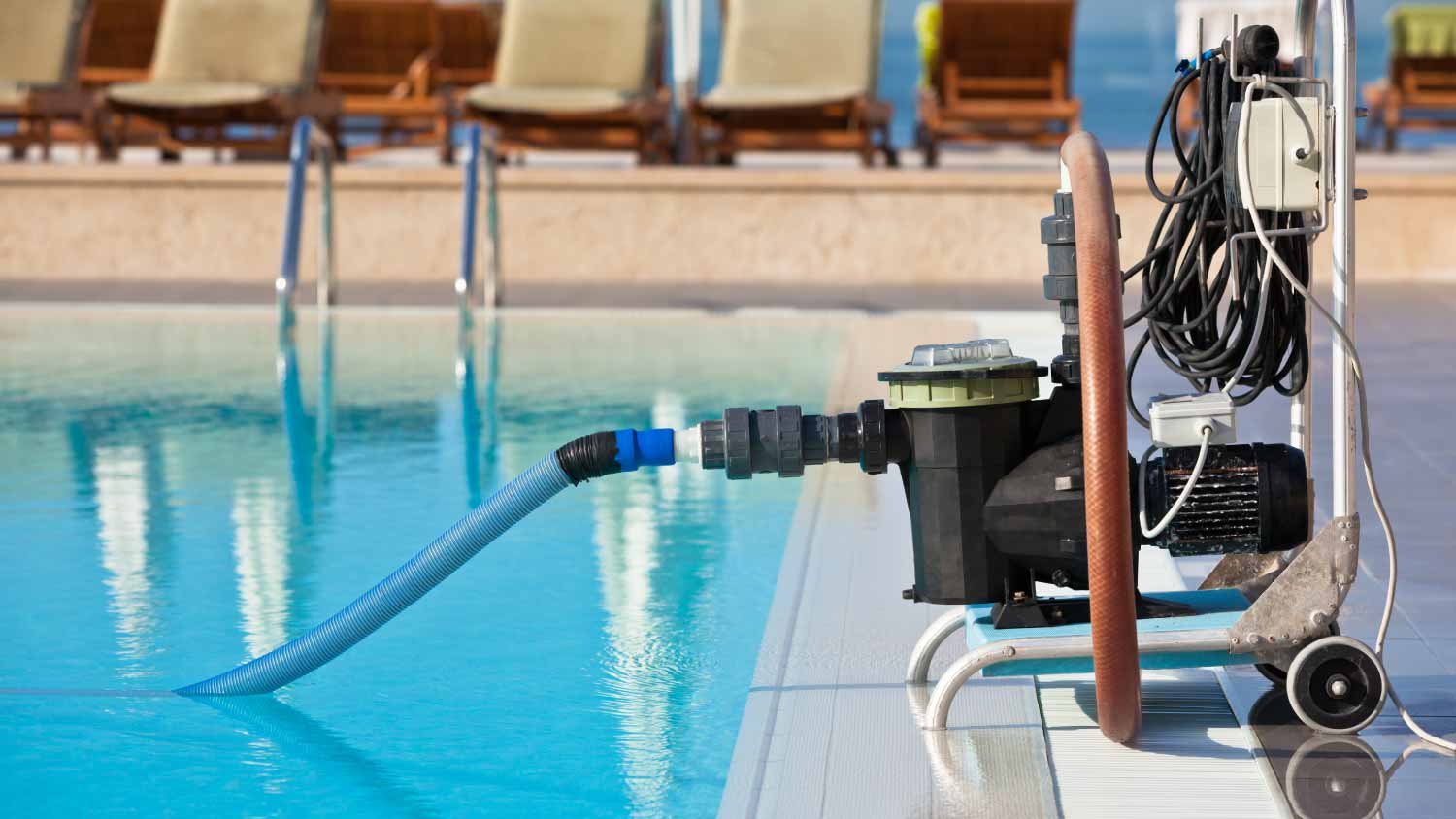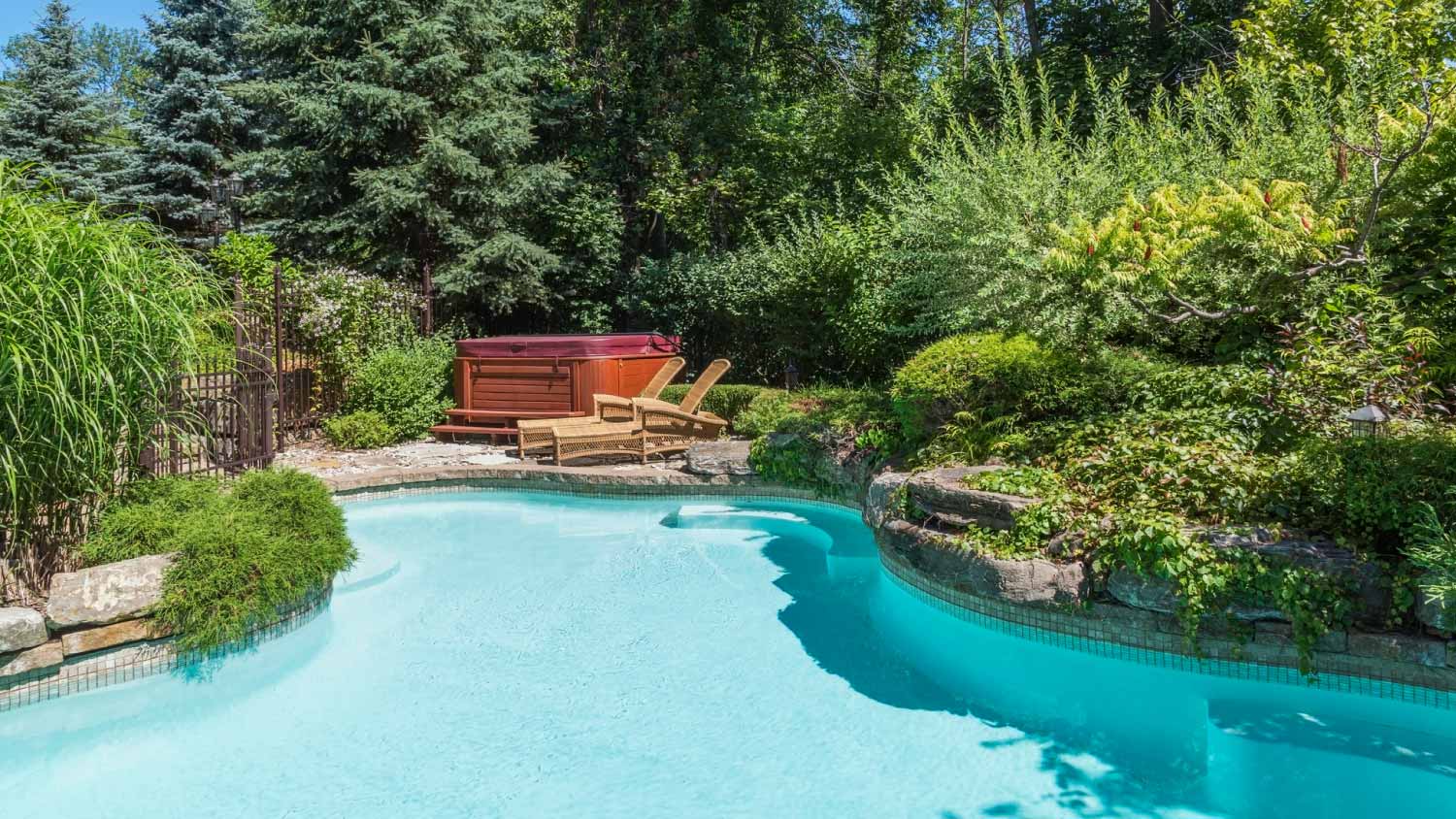
Is it time to treat yourself to backyard pool parties and late-night swims? Start with our guide, which answers the question: how much does it cost to build a pool?
Running your pool pump too long can be a real drain


Pool pumps circulate pool water to keep it clean and chemically balanced.
How long you run your pump depends on your pool’s volume and the pump’s flow rate.
Variable-speed pumps are more efficient, so you can let them run longer.
Consider your goals and energy costs when choosing the best time to run your pool pump.
Owning a pool has plenty of perks, including refreshing dips on a hot day, lounging poolside, and a built-in excuse to host summer parties. However, it also comes with maintenance tasks, and one of the biggest questions pool owners have is how long to run a pool pump. If you run your pool pump too little, you can end up with murky, unbalanced water—but run it too long, and your electricity bill might leave you feeling like you lost an underwater breath-holding contest. We dive into pool pump run time, filtration needs, and the best schedule for keeping pool water crystal clear without draining your wallet.
Pool pumps keep pool water moving to prevent stagnation and distribute chemicals. If a pool doesn’t have enough water circulation, debris settles, algae grows, and your pool starts looking like a science experiment.
Your pool pump pulls in water, filters out debris and bacteria, and returns clean water to the pool. The key is to ensure all the water in your pool cycles through the filtration system at least once daily. This is called turnover, and knowing your pool’s turnover rate lets you set the perfect pool pump schedule. Learn how below, or call a local pool pump repair company for advice on how your pool’s size and type of pump impact how long you should run it.
Start by figuring out your pool’s volume or how much water it holds. If you already know this number, you can skip the math. But if you don’t, it’s easy to calculate.
Square and rectangular pools: Length x Width x Average Depth x 7.7 = Total Volume in Gallons
Round pools: Diameter x Average Depth x 5.9 = Total Volume in Gallons
Oval pools: Length x Width x Average Depth x 6.7 = Total Volume in Gallons
Irregular-shaped or freeform pools: Longest Length x Widest Width x Average Depth x 5.9 = Total Volume in Gallons
Now, figure out the turnover rate and flow rate. The entire pool volume should cycle through the pump at least once per day. The turnover rate tells you how many gallons per hour (GPH) the pool pump needs to filter, and most pumps list their flow rate in gallons per minute (GPM), so you may need to convert GPH to GPM.
To do this, divide GPH by 60 to find GPM. Alternatively, you can multiply GPM by 60 to find GPH. For example, if your pool holds 20,000 gallons and your pump moves 40 GPM, find the turnover rate by doing this simple equation:
40 GPM x 60 minutes = 2,400 GPH
20,000 gallons / 2,400 GPH = 8.3 hours
In this example, the pool pump needs to run just over eight hours per day to achieve one full turnover.
You don't need to do calculations if you have a single-speed pool pump. Instead, run the pump for one hour for every 10 degrees Fahrenheit of air temperature. So, for an 80-degree day, run it for eight hours. If it’s a scorching 100 degrees outside, run it for 10 hours. Warm weather encourages algae growth, so the hotter it gets, the longer you should run your pump.
You can run a variable-speed pool pump longer without racking up high energy costs. Most manufacturers recommend the following:
| Speed | Function | Time (Hours) |
|---|---|---|
| High | Cleaning, skimming | 3–4 |
| Low | Circulation, filtration | 8–10 |

When you run a pool pump matters, but remember that you don’t have to run it continuously—you can break up filtration cycles to save money and get a cleaner pool. Here are some tips for timing your pool pump:
Run your pool pump during the day to keep the water cleaner.
If your utility company charges more during peak hours (usually midday to early evening), use your pool pump during off-peak hours (late night through early morning) to save money.
After shocking the pool, run the pump overnight to circulate the chemicals.
Run the pump for a few hours after regular chemical treatments to distribute the chemicals.
No matter how long you run your pump, it can’t keep your pool clean if it’s not in good shape or if the rest of your pool maintenance game isn’t up to speed. Follow these tips to get the most out of your pool pump now and for years to come:
Buy a quality pool pump: Pool pump costs vary from $700 to $4,000, but while you may pay more up front for a higher-quality, higher-efficiency model, you'll save money over time.
Keep the filter clean: A clogged filter makes pumps work harder and can cause them to use more energy, be less effective, and burn out. Keeping the filter clean will boost how long a pool pump lasts.
Use a pool cover: Pool covers keep out debris and cut down pump run time.
Adjust the pool pump run time seasonally: Set your pool pump to run longer during the summer and shorter during cooler months with less sun.
Proper pool maintenance requires close attention to your pool’s water chemistry, filtration, and circulation. Test the water regularly, especially in the summer, and empty all the baskets. Run the filtration system four to six hours per day in the winter and six to 10 hours per day in the summer.
With the right balance of run time, scheduling, prevention, and maintenance, your pool pump will help your pool stay sparkling clean without soaking your energy budget.
From average costs to expert advice, get all the answers you need to get your job done.

Is it time to treat yourself to backyard pool parties and late-night swims? Start with our guide, which answers the question: how much does it cost to build a pool?

When murky waters and slimy surfaces get in the way of your pool parties, it may be time to consider the cost to acid wash a pool. Refresh your pool by bringing in the pros.

Hot tub costs vary, depending on the type of spa you choose. Learn how much hot tubs cost in 2025 and how to save on new hot tub prices.

How much shock does my pool need? Here's how to calculate how much pool shock to add to your pool based on its overall water condition.

Learning how to drain a pool is just as important as all the other upkeep tips you've gathered along the way. Here's a step-by-step DIY guide.

From soaks to aerobics to cold dips, having a plunge pool offers tons of benefits. Learn everything you need to know about DIY plunge pool ideas and tips.